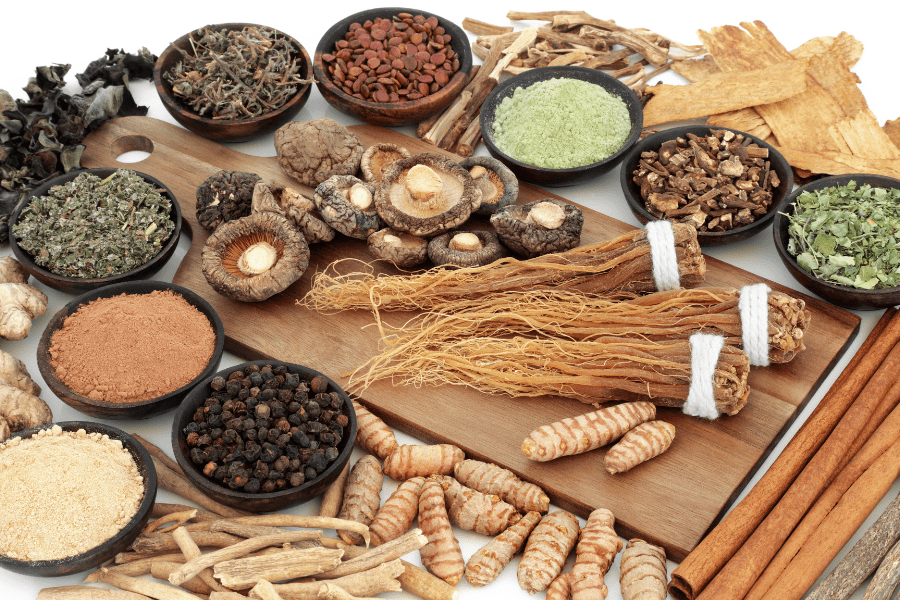Adaptogens and Digestion: What You Need to Know
What Are Adaptogens and How Do They Work?
These special plants and herbs have been used for centuries in traditional medicine practices. But what exactly are they? Adaptogens are non-toxic substances that help our bodies “adapt” to stress and maintain balance.
This post includes affiliate links. Click here for my full disclosure policy.
So, how do these plant-powered wonders work their magic? When we’re stressed, our bodies go into fight-or-flight mode, releasing cortisol and other stress hormones. Adaptogens step in like a cool, calm friend and say, “Hey, let’s take it down a notch.” They help regulate our stress response systems, supporting our adrenal glands and keeping those pesky stress hormones in check. The result? Better energy, improved focus, and a more balanced mood. Who doesn’t want that?
Gut-Brain Connection
Now, here’s where it gets really interesting – the gut-brain connection. Did you know your gut and brain are besties who chat all day long? It’s true! This two-way communication highway is called the gut-brain axis, and it plays a huge role in how we feel, both physically and mentally. Stress can wreak havoc on this delicate balance, leading to digestive issues and mood swings. But guess what? Adaptogens can help here too!
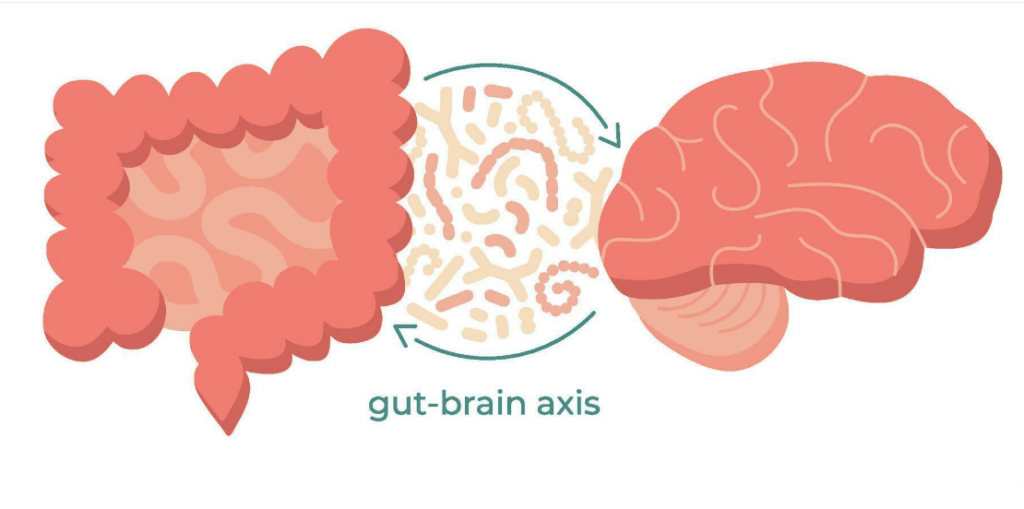
By supporting our body’s stress response, adaptogens indirectly benefit our gut health. They can help soothe inflammation, support the growth of beneficial gut bacteria, and even strengthen the gut lining. Plus, some adaptogens have direct effects on digestion, like ginger’s ability to ease nausea or turmeric’s anti-inflammatory properties. It’s like a double whammy of goodness for your gut and your stress levels!
Remember, though, adaptogens aren’t a magic pill. They work best as part of a holistic approach to health, combined with a balanced diet, regular exercise, and good sleep habits. But when used correctly, these powerful plants can be a game-changer for your overall well-being. So why not give your gut and your stress levels a little adaptogenic love?
Top Adaptogens for Digestive Health
Ashwagandha
Ashwagandha, the stress-busting superstar of the adaptogen world. This ancient Ayurvedic herb isn’t just great for calming your mind; it’s a total gut health hero too! By reducing stress, Ashwagandha helps keep your digestive system running smoothly. Some studies even suggest it might help with inflammatory bowel conditions. Talk about a win-win for your belly and your brain!
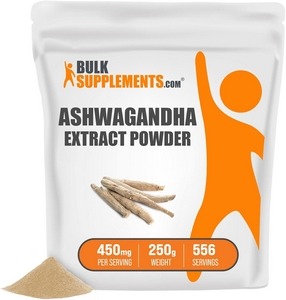
Ashwagandha Root Powder

Ginseng
Next on our list is Ginseng, the energizing root that’s been used in traditional Chinese medicine for centuries. But did you know it’s also a prebiotic powerhouse? That’s right! Ginseng acts like a gourmet meal for your good gut bacteria, helping them thrive and multiply. A happy gut microbiome means better digestion, stronger immunity, and even improved mood. It’s like hosting a party for your beneficial bacteria – and everyone’s invited!
Lion’s Main Mushroom

Now, let’s talk about Lion’s Mane, the funky-looking mushroom that’s making waves in the wellness world. This shaggy ‘shroom is a superstar when it comes to supporting your gut health. It helps strengthen your intestinal barrier (think of it as your gut’s security system), keeping those pesky toxins out and nutrients in. Plus, Lion’s Mane has been shown to increase the diversity of your gut microbiome. Remember, when it comes to gut bacteria, variety is the spice of life!
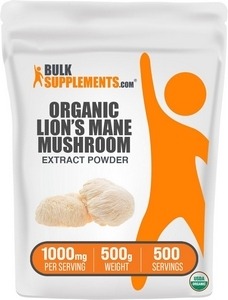
Lion’s Mane Mushroom Powder
Turmeric
Last but certainly not least, we have the golden child of the spice world – Turmeric. This vibrant yellow spice, and its active compound Curcumin, are inflammation-fighting dynamos. When it comes to digestive health, less inflammation means less discomfort and better overall function. Turmeric has been shown to support digestion, reduce bloating, and even help with conditions like irritable bowel syndrome. It’s like a soothing, spicy hug for your insides!
Remember, while these adaptogens are fantastic for supporting digestive health, everyone’s body is different. It’s always a good idea to start slow and listen to your body. And hey, why not mix and match? You could create your own personal adaptogen blend for gut health. Just imagine – a warm, comforting tea with Ashwagandha, Ginseng, Lion’s Mane, and a dash of Turmeric. Now that’s what I call a digestive delight!
The Science Behind Adaptogens and Gut Health
The science behind adaptogens and digestion is still in its early stages, but boy, is it exciting! Current research suggests that adaptogens may play a role in supporting gut health through various mechanisms. For instance, some studies have shown that certain adaptogens, like ashwagandha and ginseng, can help reduce inflammation in the gut and support the growth of beneficial gut bacteria. It’s like they’re throwing a party for your microbiome!
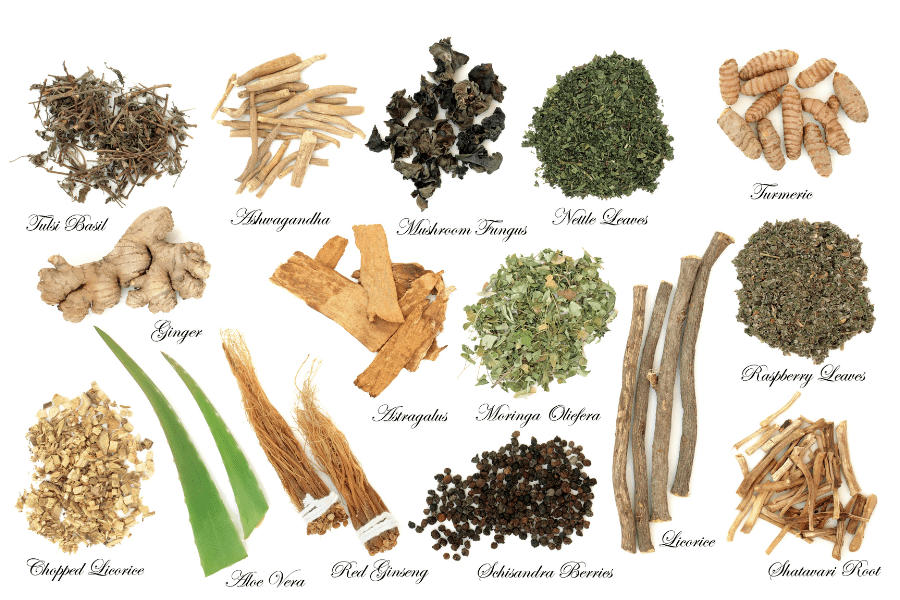
May Reduce Inflammation
While the initial research is promising, we’ve got to acknowledge some limitations. Many of the studies on adaptogens and gut health have been conducted in vitro or on animals, which means we can’t automatically assume the same effects in humans. Plus, the sample sizes in human studies have often been small, and long-term effects aren’t well understood yet. It’s like we’ve got a treasure map, but we’re still figuring out how to read it!
May Help Manage Stress
So, how might adaptogens work their magic on our digestive system? Well, there are a few potential mechanisms at play. First, by helping to manage stress, adaptogens may indirectly support gut health – remember that gut-brain connection we talked about earlier?
Soothe Digestive Tract
Additionally, some adaptogens have shown prebiotic effects, feeding those good gut bacteria we love so much. Others, like turmeric, have potent anti-inflammatory properties that could soothe the digestive tract. And let’s not forget about adaptogens that may help strengthen the intestinal barrier, keeping those pesky toxins out and nutrients in.

In a nutshell, while we’re still piecing together the full picture of how adaptogens influence gut health, the early signs are promising. It’s like we’re on the cusp of a gut health revolution! But remember, adaptogens aren’t a magic bullet. They work best as part of a holistic approach to health, alongside a balanced diet, regular exercise, and good sleep habits. So, keep an eye on this space – the future of adaptogens and gut health looks bright!
How to Incorporate Adaptogens into Your Digestive Wellness Routine
First things first, consistency is key when it comes to adaptogens. These aren’t one-and-done miracle workers; they’re more like loyal friends who show up every day to support you. Start with one adaptogen at a time, and give it at least a few weeks to work its magic. It’s like dating – you’ve got to give it time to see if you’re a good match! And remember, while adaptogens are generally safe, it’s always a good idea to chat with your healthcare provider before adding them to your routine, especially if you’re pregnant, nursing, or taking medications.
Now, let’s talk dosage and form. Adaptogens come in all shapes and sizes – teas, tinctures, capsules, powders, oh my! The right form for you depends on your preferences and lifestyle. Love a cozy cup of tea? Try adaptogenic blends with ashwagandha or ginseng. Always on the go? Capsules might be your best bet. Smoothie fanatic?

Powders are perfect for blending into your favorite recipes. As for dosage, it varies depending on the specific adaptogen and your individual needs. For example, a typical dose of ashwagandha might be 300-500 mg twice daily, while lion’s mane dosages can range from 500-3000 mg per day. Start low and slow, and work your way up as needed.
Timing Matters
Here’s a pro tip: timing matters! Some adaptogens, like rhodiola, can be energizing, so they’re best taken in the morning. Others, like ashwagandha, can be calming and might be better suited for evening use. And hey, why not get creative? Sprinkle some adaptogenic powders into your morning oatmeal, blend them into a post-workout smoothie, or even try cooking with adaptogenic herbs like turmeric. Your taste buds and your gut will thank you!
Contraindications
But hold up, we need to talk about potential interactions and precautions. While adaptogens are generally safe, they can interact with certain medications. For example, some adaptogens might affect blood sugar levels or blood pressure, so if you’re taking medications for these conditions, definitely check with your doc first. Also, if you’re pregnant or breastfeeding, it’s best to err on the side of caution and avoid adaptogens unless specifically recommended by your healthcare provider. And remember, more isn’t always better – stick to recommended dosages to avoid any potential side effects.
Incorporating adaptogens into your digestive wellness routine can be a game-changer, but it’s not a substitute for a healthy lifestyle. Think of adaptogens as the cherry on top of your wellness sundae – they work best when combined with a balanced diet, regular exercise, stress management techniques, and good sleep habits. So go ahead, give adaptogens a try, and get ready to show your gut some serious love!
Beyond Adaptogens: Holistic Approaches to Digestive Health
While adaptogens are awesome, they’re just one piece of the gut health puzzle. Let’s explore some other ways to keep your tummy happy and healthy! First up, let’s talk about the foundation of good gut health – a balanced diet and lifestyle.
Lifestyle Considerations
You’ve heard it before, but I’ll say it again: you are what you eat! Fill your plate with a rainbow of fruits and veggies, whole grains, and lean proteins. These nutrient-dense foods feed your good gut bacteria and provide the fiber your digestive system craves. And don’t forget about hydration – water is your gut’s best friend! As for lifestyle, regular exercise isn’t just great for your waistline; it’s a digestive superstar too. Even a brisk 30-minute walk can help keep things moving smoothly down there!
Stress
Now, let’s talk about the elephant in the room – stress. It’s no secret that stress can wreak havoc on our digestion. Ever had butterflies in your stomach before a big presentation? That’s your gut-brain connection in action! Incorporating stress management techniques into your daily routine can work wonders for your digestive health. Try deep breathing exercises, meditation, or yoga. Even simple things like taking a relaxing bath or listening to calming music can help. Remember, a relaxed mind often leads to a happy gut!

Feed Your Microbiome
But wait, there’s more! Probiotics are like a party for your gut microbiome. These beneficial bacteria can help improve digestion, boost immunity, and even influence your mood. You can find probiotics in fermented foods like yogurt, kefir, and sauerkraut, or take them as supplements. And let’s not forget about the power of mindful eating. Slow down, savor your food, and really pay attention to what you’re eating. It’s not just about what you eat, but how you eat it!
Other Holistic Practices
Other complementary practices can also support your digestive health journey. Ever tried acupuncture? Some people swear by it for digestive issues. Herbal teas like peppermint or ginger can be soothing for an upset stomach.
Restorative Sleep
And don’t underestimate the power of a good night’s sleep – your gut needs rest too! Lastly, consider keeping a food diary. It can help you identify any trigger foods that might be causing digestive discomfort.
Conclusion
Remember, everyone’s gut is unique, so what works for one person might not work for another. It’s all about finding the right balance for you. Think of it as a fun experiment – try different approaches, see what feels good, and don’t be afraid to adjust as needed. Your gut health journey is just that – a journey. So be patient, stay curious, and most importantly, listen to your body. Here’s to happy, healthy guts!
Ready to Learn More About Adaptogens?
Adaptogens are not just a current fad or craze–learn all about this category of herbs. Click the link below for your free Ultimate Guide to Adaptogens.

